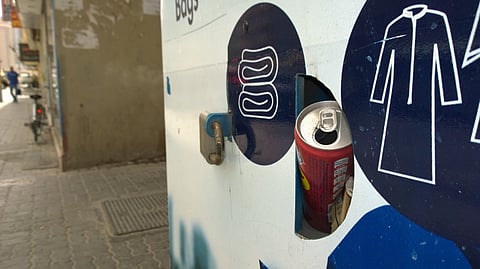Charity boxes stuffed with litter in Sharjah
Donation points intended to help the needy being abused by residents

Sharjah: Residents have been urged not to abuse “charity bins” by dumping litter or using them as racks for bicycles or as storing places for mops or grocery crates. People chuck in trash into the space for the door handle. Some even turn inventive by using them as bulletin boards to post news about rents and accommodation.
Also, some boxes are dirty on the outside, caused by littering or apparently due to infrequent servicing.
The large metal bins placed on pavements next to buildings are for taking in donated clothes, textiles, shoes and bags by the environment company Bee’ah.
In a few cases, residents said, the boxes obstruct pedestrians movement on pavements. However, a Bee’ah official said the boxes are “carefully placed” to avoid any inconvenience to the public.
Mohammad Al Hosani, Director of Sales and New Product Development, Bee’ah, urged residents to respect the purpose of the charity bins and adhere to their “right usage”.
“I think it’s mostly children who [throw] litter into the bins, maybe they are being naughty,” said an Indian grocery manager on Al Intifada Street, whose shop is located right next to a charity bin that had trash crammed into the door handle space.
“It’s very clear to everyone these are not trash bins,” he added. “There are pictures and instructions on them stating they are for charity and what can go into it.”
A tenant in Al Taawun area said the box next to her building was “filthy”. “There’s rubbish on top of it, there’s stuff trickling down its side, and it’s a hangout for kids who like to feed cats with milk and food next to it,” she added.
An Arab restaurant worker in Al Majaz 2 said the box next to his restaurant was placed almost halfway onto the footpath. “This does not seem right to me. They could have placed it all the way back into the gravel area right behind it,” he added.
During a random survey of dozens of boxes, Gulf News came across cases where there were bicycles, mops, crates and large water bottles placed next to them or on top of them.
The bins are visited by Bee’ah staff for collection daily or weekly, Al Hosani said. But many bins continue to be abused.
Al Hosani called for responsible use of these charity collection points, adding that residents can get in touch with Bee’ah for any concerns, suggestions or complaints.
He informed Gulf News that there are over 500 charity bins distributed across Sharjah. They are placed in different residential and commercial areas, and several have been placed by educational institutions. Al Hosani said that care has been taken to place bins in each location so they do not block traffic, access to roads, or building entrances, and are not a cause for disturbance for residents living in the area.
However, their misuse is not a common problem that Bee’ah has faced, he said.
“The bins have clear messages and instructions on them in more than one language along with photos to indicate what can be placed in them,” explained Al Hosani.
Depending on the location and the frequency of donations deposited in the bin, the donated goods are collected either daily or weekly.
Reusable items in good condition are sent to charity organisations in collaboration with Bee’h, whereas non-usable items are sent to treatment facilities for recycling.
Other bins are handled by Sharjah Charity International, which also occasionally suffer abuse, despite clear instructions on how to use them.
“I hope that residents will convey Beeah’s message about the right usage of the bins to others,” said Al Hosani.



